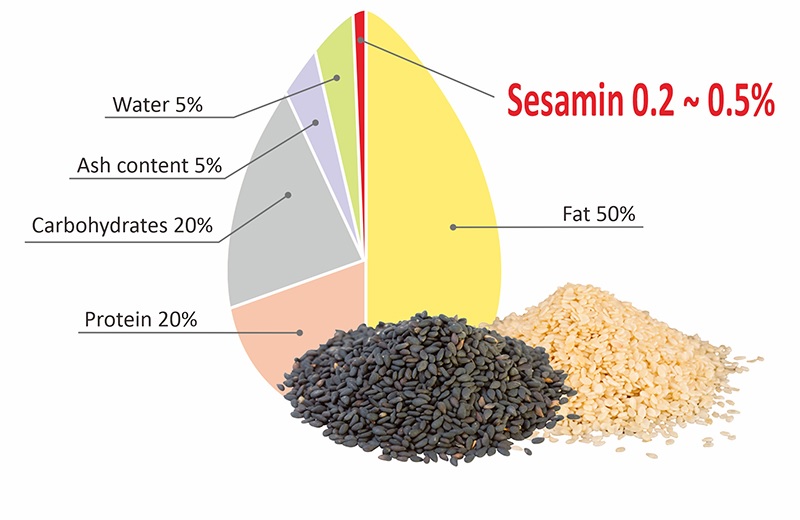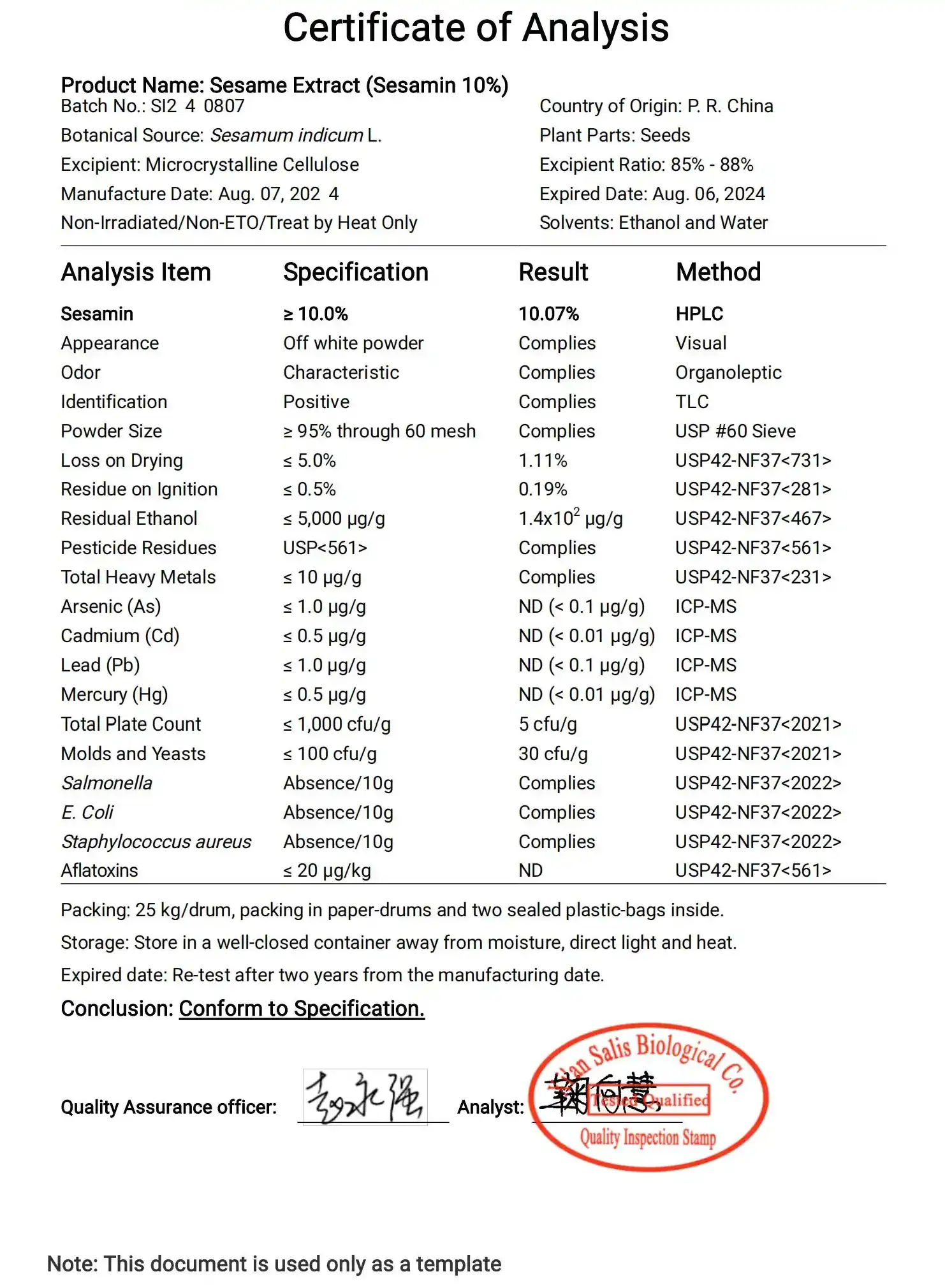
What are the key benefits of sesamin for athletes?
Sesamin Powder, a lignan found in sesame seeds, offers several potential benefits for athletes and active individuals. These benefits extend beyond muscle recovery and may contribute to overall athletic performance and health:
- Antioxidant properties: Sesamin acts as a powerful antioxidant, helping to neutralize free radicals produced during intense exercise. This antioxidant effect may reduce oxidative stress and inflammation in the body, potentially leading to faster recovery times and decreased muscle soreness.
- Enhanced fat metabolism: Research suggests that sesamin may increase the activity of enzymes involved in fat oxidation. This could lead to improved energy utilization during exercise and potentially aid in body composition management for athletes.
- Improved lipid profile: Regular consumption of sesamin has been associated with improvements in blood lipid profiles, including reduced LDL cholesterol and increased HDL cholesterol. This may contribute to better cardiovascular health, which is crucial for endurance athletes.
- Potential anti-inflammatory effects: Some studies indicate that sesamin may have anti-inflammatory properties, which could be beneficial in reducing exercise-induced inflammation and promoting faster recovery.
- Support for liver function: Sesamin has been shown to have hepatoprotective effects, potentially supporting liver health. A healthy liver is essential for overall metabolism and detoxification processes, which are important for athletes.
While these benefits are promising, it's important to note that more research is needed to fully understand the extent of sesamin's effects on athletic performance and recovery. Athletes should always consult with a healthcare professional or sports nutritionist before incorporating new supplements into their regimen.
How does sesamin powder affect muscle protein synthesis?
Muscle protein synthesis (MPS) is a crucial process in muscle recovery and growth after exercise. While sesamin powder has not been directly linked to increased muscle protein synthesis, its effects on other physiological processes may indirectly support this important aspect of recovery:
- Antioxidant support: The antioxidant properties of sesamin may help create a more favorable environment for muscle protein synthesis. By reducing oxidative stress and inflammation, sesamin could potentially allow the body to allocate more resources towards muscle repair and growth.
- Hormonal balance: Some studies suggest that sesamin may influence hormone levels, particularly those related to stress and inflammation. By promoting a more balanced hormonal environment, sesamin could indirectly support optimal conditions for muscle protein synthesis.
- Nutrient partitioning: The potential effects of sesamin on fat metabolism and energy utilization may contribute to improved nutrient partitioning. This could result in more efficient use of dietary protein for muscle repair and growth.
- Mitochondrial function: Research indicates that sesamin may enhance mitochondrial function. Improved mitochondrial health could lead to better energy production and cellular repair processes, potentially supporting muscle protein synthesis.
- Insulin sensitivity: Some studies suggest that sesamin may improve insulin sensitivity. Enhanced insulin sensitivity could lead to more efficient nutrient uptake by muscle cells, potentially supporting muscle protein synthesis.
While these mechanisms suggest potential indirect support for muscle protein synthesis, it's important to note that direct evidence linking sesamin to increased MPS is currently limited. More research is needed to fully understand the relationship between sesamin consumption and muscle protein synthesis rates.
Athletes and fitness enthusiasts should remember that muscle protein synthesis is primarily driven by adequate protein intake and resistance exercise. Sesamin powder should be viewed as a potential supplement to support overall recovery and health, rather than a direct stimulator of muscle growth.
Can sesamin powder reduce muscle soreness and inflammation post-workout?
One of the most intriguing potential benefits of sesamin powder for athletes is its ability to reduce muscle soreness and inflammation following intense exercise. This effect, if proven, could significantly impact recovery times and overall training quality. Let's explore the current understanding of sesamin's role in post-workout recovery:
- Anti-inflammatory properties: Sesamin has demonstrated anti-inflammatory effects in various studies. This property may help mitigate the acute inflammation that occurs after strenuous exercise, potentially leading to reduced muscle soreness and faster recovery times.
- Oxidative stress reduction: The potent antioxidant nature of sesamin may help combat exercise-induced oxidative stress. By neutralizing free radicals produced during intense physical activity, sesamin could help minimize cellular damage and subsequent inflammation.
- Improved blood flow: Some research suggests that sesamin may have vasodilatory effects, potentially improving blood flow to muscles. Enhanced blood circulation could aid in the removal of metabolic waste products and the delivery of nutrients to recovering muscles.
- Modulation of inflammatory markers: Studies have shown that sesamin may influence the production and activity of various inflammatory markers in the body. This modulation could contribute to a more balanced inflammatory response post-exercise, potentially reducing excessive inflammation without compromising the necessary adaptive processes.
- Potential analgesic effects: While more research is needed, some studies have hinted at potential analgesic properties of sesamin. If confirmed, this could directly contribute to reduced perceived muscle soreness after workouts.
Despite these promising indications, it's important to note that the research on sesamin's direct effects on post-workout muscle soreness and inflammation is still emerging. Many of the studies conducted have been in vitro or animal studies, and more human trials are needed to confirm these effects in athletes and active individuals.
Furthermore, the effectiveness of sesamin in reducing muscle soreness and inflammation may vary depending on factors such as dosage, timing of consumption, and individual physiology. Some athletes may experience more pronounced benefits than others, and consistent use over time may be necessary to observe significant effects.
It's also worth noting that while reducing inflammation can be beneficial for recovery, some level of inflammation is necessary for muscle adaptation and growth. Therefore, athletes should be cautious not to completely suppress the inflammatory response, as this could potentially hinder long-term progress.
Conclusion
While sesamin powder shows promise in potentially reducing muscle soreness and inflammation post-workout, more research is needed to fully understand its effects and optimal use in athletic recovery. Athletes interested in incorporating sesamin into their recovery routine should do so under the guidance of a healthcare professional or sports nutritionist, and in conjunction with proven recovery strategies such as proper nutrition, hydration, and adequate rest.
If you are also interested in this product and want to know more product details, or want to know about other related products, please feel free to contact lea_slsbio@163.com,WhatsApp+86 13193326505.


